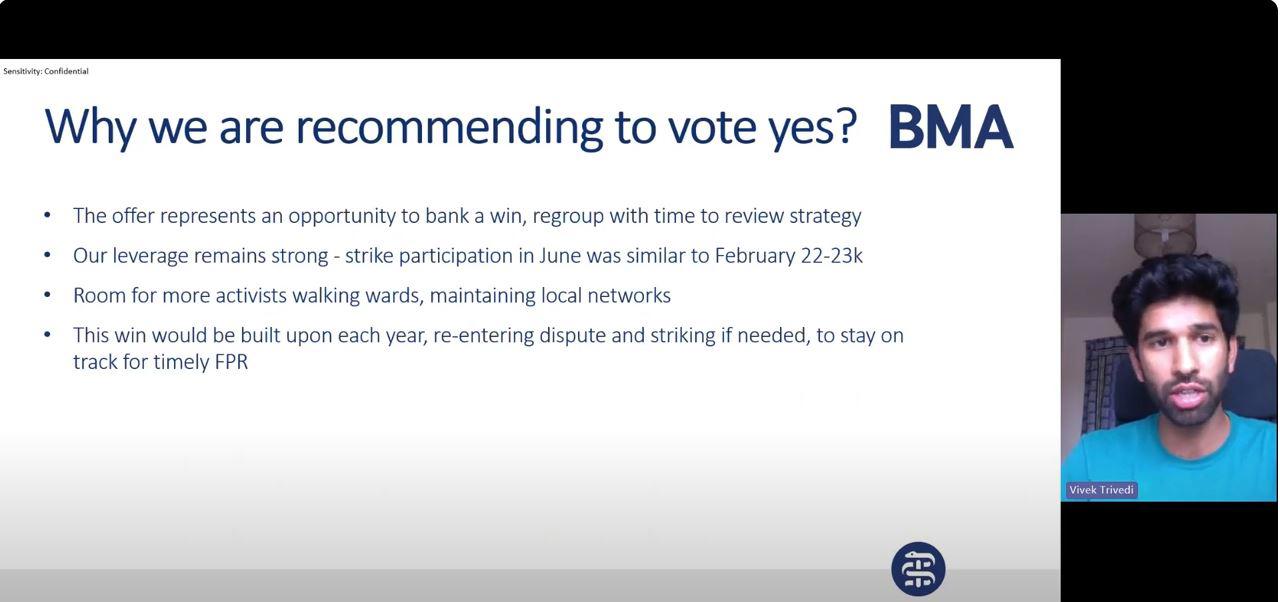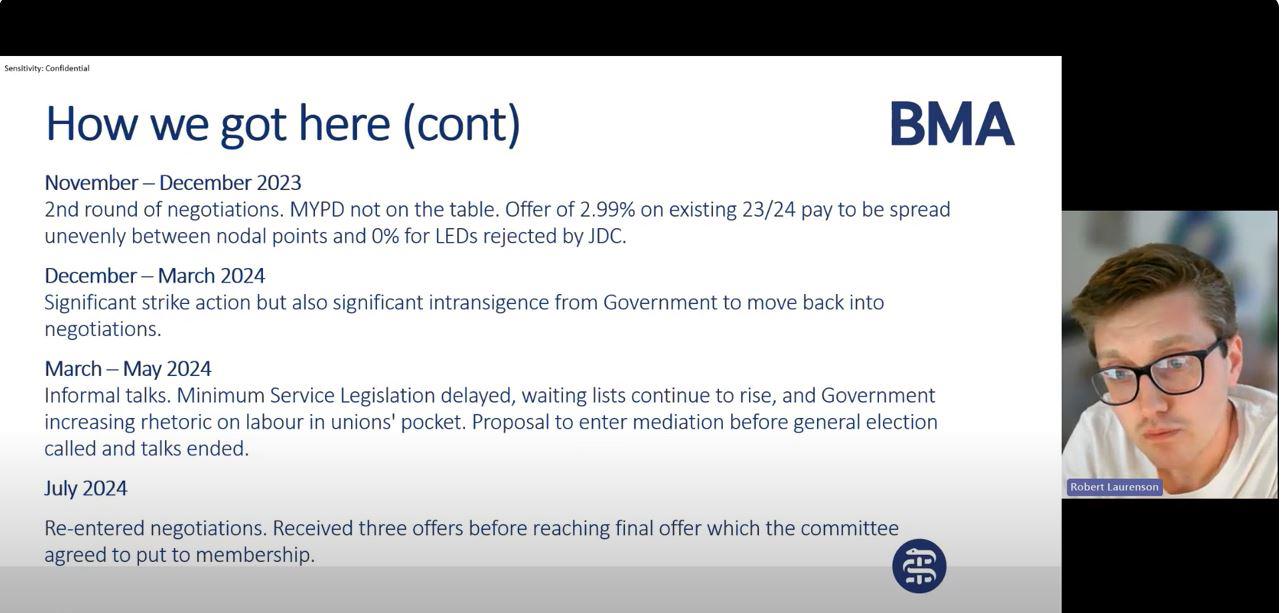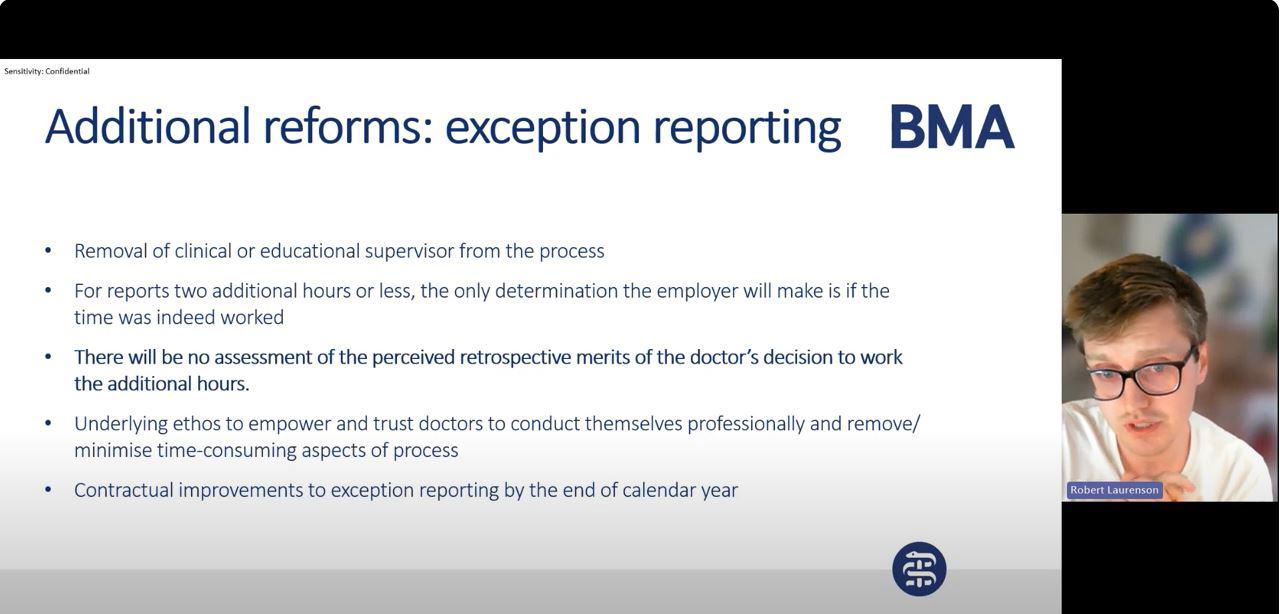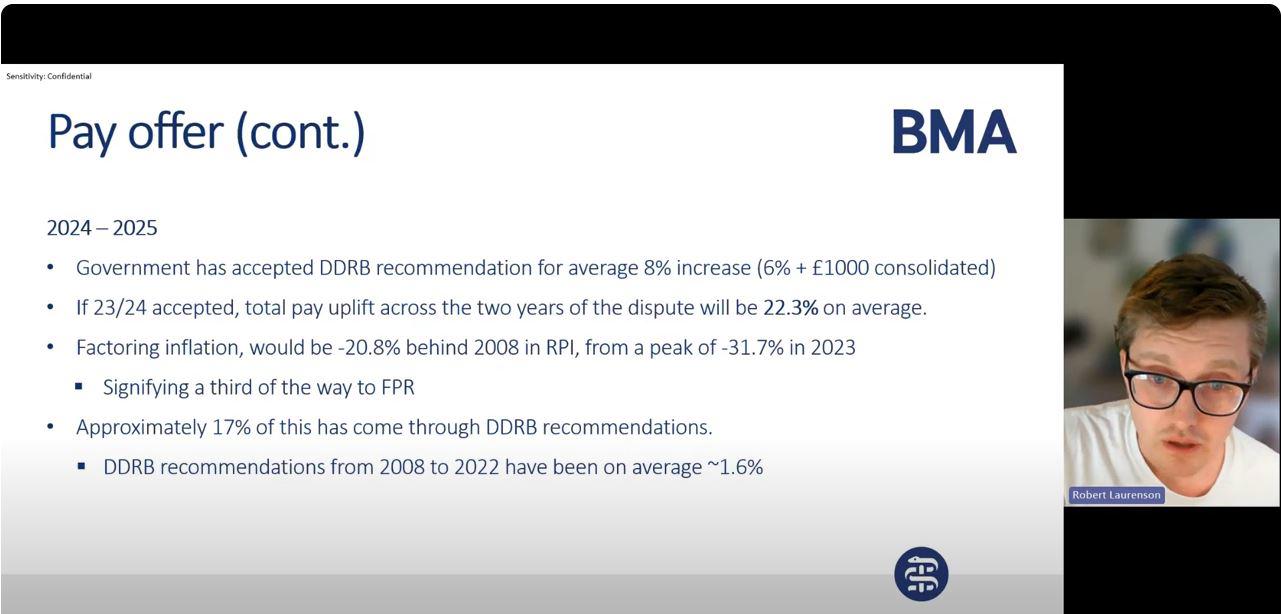The offer
Did the BMA resident doctors committee recommend the offer is accepted? Why?
Yes. The committee believe that, although this offer does not achieve full pay restoration in one step, it represents a good enough first step given the amount of leverage we have against the relatively new Government.
- It will improve basic pay, in both actual and real terms, for both 2023/24 and 2024/25, with no doctor left behind: it adds 4.05% to the DDRB recommendation for 2023/24, which would in turn be compounded by the DDRB recommendation for 2024/25. The resulting pay uplift will be a 22.3% average increase over the two years.
- This offer moves us about a third of the way in our journey to full pay restoration (our pay erosion would go from 31.7% at its peak to 20.8%). This is a journey we will move further along each year, banking wins along the way, re-entering disputes if necessary and giving our organisation time to build capacity in between.
- By accepting this offer now, we essentially 'bank' the pay rise (and backdated lump sum), and this higher pay will create the baseline from which the DDRB will make its recommendation for 2025/26.
- We have been clear that should the DDRB fail to deliver on its reforms or recommend a sufficient uplift to continue making progress towards FPR, or should the Government fail to accept the recommendations on time, we will open a new dispute and ballot for action again after April 2025.
- Given the circumstances and context we’re in, we believe there was benefit in banking this progress, and the non-pay reforms in the offer. These improvements will be built upon as we continue to move towards achieving FPR.
We have an opportunity to strengthen our workplace power, renew our campaign strategy, replenish personal strike funds, and build up our central strike fund with new ARM policy, ready if needed for the second phase of our campaign for full pay restoration. It is the committee’s view that accepting this offer, to be built upon each year, is the best way to achieve full pay restoration for doctors in England.

How is this offer different to the one RDC voted to reject in December?
Pay uplift
- In December we were offered an average 2.99% uplift on existing 2023/24 pay.
- This offer is an average 4.05% uplift on existing 2023/24 pay.
Backdating
- This offer will be backdated to April 2023, therefore increasing the immediate and overall value of the deal. If the offer is accepted, all resident doctors will receive thousands of pounds of backpay, which will help to recuperate strike-related deductions.
- This backdating ensures that doctors who have undertaken strike action in the last 12 months but have since CCTed or left the profession will still benefit.
- The offer in December would not have been backdated.
See 'what will my back pay be?
No doctor left behind
- This offer includes above inflation pay uplifts for not only doctors on 2016 terms and condition of service but also all Locally Employed Doctors (e.g. junior clinical fellows/ trust grades), including those on 2002 terms and conditions of service.
- The offer in December would not have done this. Leaving just one doctor behind, enduring further pay erosion, was unacceptable to the committee.
- The offer in December also excluded doctors on nodal point 2 (FY2) and the uplift to NP4 (ST3/4/5) was still sub-inflationary.
2024/2025 pay uplift
- The DDRB would not have recommended an above inflation uplift (average 8%) for a second year in a row if we had accepted the offer in December and not taken industrial action.
Non pay measures
- The non-pay reforms offered in December were piecemeal, but we believe the reforms we have secured in the current offer are genuine and can have a transformative impact for doctors.
- These include reform of exception reporting, safeguarding of the FPP, as well as reviews into rotations and training numbers.
DDRB
- As part of this offer we were given a commitment that the Government’s remit letter to the DDRB for next year will include asking it to consider, as part of its pay recommendations, the overall reward package and career progression for resident doctors to ensure that medicine is an attractive and rewarding career choice to deliver our consultants and GPs of the future.
- There was no reference at all to the future in December’s deal, and the DDRB’s recommendation for 2024/25 would have been lower.
- Additionally, DDRB reforms agreed as part of the consultants’ deal are due to be implemented for the 2025/26 pay round, including no longer being given a spending constraint as part of their remit letter.

Was there scope to go back to the Government for more?
This is the third offer received from this Government, which built upon the offers rejected from the last Government. It is the negotiating team's assessment that there was nothing further we could achieve in the room, with the leverage we currently have. It is unlikely that any meaningful concessions could be achieved at this point without prolonged and escalated industrial action.
What commitment have we secured for future years?
We have secured the following wording in terms of the remit the Government will give to the DDRB:
“The government acknowledges concerns raised by the BMA and other parties that the medical profession is not as attractive a career prospect as it once was. The Secretary of State for Health and Social Care would therefore like the DDRB to consider, as part of its pay recommendations, the overall reward package and career progression for resident doctors to ensure that medicine is an attractive and rewarding career choice to deliver our consultants and GPs of the future”.
A written commitment to pay restoration is something we raised with both Conservative and Labour governments. After multiple iterations, this wording is as far as they were willing to go with the leverage we currently have. Whilst we would have liked the wording to go further, it sets a baseline for Government and the DDRB to continue to provide uplifts above inflation and continue to address pay erosion. It is important to note that there are other reforms to the DDRB, agreed by our consultant colleagues, due to come in for the 2025/26 pay year.
We also felt that a written commitment was not a red line worth insisting on, given promises can still be broken: we have seen this in other UK nations with governments with more longstanding trust than ours rowing back on such commitments. Rather than holding out for words from a Government which has not yet earned our trust, we are placing our trust in each other – our members, colleagues, and union. We are committed to achieving FPR and will re-enter dispute and take strike action any and every year we need to.

Will the exception reporting changes be contractual?
We have secured confirmation that the changes will be contractual and also agreed by the end of this calendar year.
How will the changes to exception reporting be different from the status quo?
You can read about the full details of the reforms agreed but the key changes are:
- Remove supervisors from the process.
- Draconian deadlines removed.
- Remove requirements to justify.
- Lower threshold of scrutiny for everything under 2 hours.

Back pay
When will it be paid?
Back pay and pay uplifts will be paid in November 2024. If your payslip does not reflect this, escalate immediately to your Trust, raise with your local BMA representatives, and seek further assistance from the BMA if you need it.
Who is responsible for paying my back pay?
Employers are responsible for paying back pay. If you have changed employers since April 2023, each employer is responsible for back pay for the period you were in their employment.
The Government has committed to ensuring that resident doctors receive what we have secured through industrial action. The representative body for NHS organisations employing the vast majority of doctors, NHS Employers, has given assurances that backpay will be paid in November by responsible Trusts.
The Universities and Colleges Employers Association (UCEA) has issued a revised pay circular for university-employed clinical academics reflecting the changes in the NHS, so doctors in this group should expect payment from relevant universities as well.
We have been given assurances that NHS employers have been suitably advised via the Electronic Staff Record (ESR) system to make sure they correctly administer and provide you with your backpay. University employers are implementing their own arrangements.
Is there anything I should do?
Employers hold responsibility for actioning payment, doctors are not responsible for initiating backpay or pay uplifts. Back pay requires employers to have access to accurate payment details (e.g. bank account) for past employees. If your payment details have changed since you left an employer, you will need to ensure the employer has access to up-to-date details. In this case, we advise contacting relevant Trust HR/Payroll teams and requesting acknowledgement by email to ensure prompt payment. You may find our template letter helpful to use to do this.
I have not received my back pay entitlement in the November payroll. What should I do?
The national employer commitment was for backpay to be received in the November payroll. Employers hold responsibility for actioning payment. If you have received your November payslip and it does not include the back pay you are entitled to, your back pay is overdue and therefore in breach of the pay deal implementation arrangements. We advise that you escalate this immediately with your Trust and raise it with your local BMA representatives. You may find our template letter helpful to use to do this.
I think my back pay has been calculated incorrectly. What should I do?
If you believe your backpay has been calculated incorrectly, we advise that you escalate this immediately to your Trust pay roll team and raise it with your local BMA representatives. Ask your trust for a breakdown of your back pay calculations, confirmation of your grade, start and end dates for each of your rotations. Your back pay total may be affected by previous deductions such as strike deductions, which may mean it is slightly lower than expected if your calculations were based off work schedules.
I have returned from maternity/paternity/parental leave, but I have been told that my maternity/paternity/parental pay recalculation will not be processed until 2025. What should I do?
All backpay payments, including for those returning from maternity/paternity/parental leave should have been processed in the November payroll. It is simply unacceptable when trusts have failed to do so, and we would strongly encourage everyone in this position to escalate with your trust and local BMA representatives. Please also report this in our BMA portal and get in touch with the BMA to make a discrimination complaint against your employer.
What tax year will I be taxed on for the backpay element of the deal?
All components of the pay deal will be taxed in the 2024/25 tax year when the payment is made. Although the pay award calculations reference previous years of service, the legal right to payment only arose when the deal was finalised. Since there was no contractual entitlement to this pay uplift during 2023/24, income tax should be deducted in the 2024/25 tax year.
HMRC regulations require all tax and National Insurance contributions on lump sum payments to be calculated using the rates and rules of the payment year only.
Despite our persistent efforts during negotiations and continued advocacy afterwards to have 2023/24 backpay tax deductions applied to that tax year, taxation arrangements remain outside the written agreements of the deal.
I’ve been taxed with an emergency tax code – what should I do?
Emergency tax codes are frequently applied in these situations. Any tax overpayment will be automatically adjusted in your next year’s tax code. If you prefer not to wait, you can request an earlier reimbursement directly from HMRC through their website.
What can I expect when I contact the BMA?
In typical underpayment cases we would consider allocating an individual case officer who you would work with you to chase the employer for payment.
As this pay deal affects tens of thousands of doctors up and down the country, and due to the volume of queries we are receiving, we will be pursuing these underpayments collectively. By using our reporting tool accompanying the template letter, you will be able to receive updates from the relevant local BMA representatives, and provide them with data to enable them to pursue this for you and your colleagues.
I worked as a resident doctor for a trust in the period 23/24 who have said they do not believe they are liable to pay me back pay. What should I do?
Flag to your employer the NHS Employer guidance that explicitly states their responsibility to do so, cc’ing in your local BMA representative, and contact the BMA nationally so we can raise with their representative body for your Employer.
I undertook maternity / paternity leave during the period affected by these pay uplifts. What impact will this have on my maternity / paternity pay?
The relevant part of the staff handbook applicable to resident doctors in this instance sets out on the calculation of maternity / paternity pay that, in the event of a retrospective pay award: “If such a pay award was agreed retrospectively, the maternity pay should be re-calculated on the same basis”.
These clauses, in particular the retrospective agreement of the pay award, would ensure that doctors who undertook maternity leave should have their pay recalculated based upon what it would have been had the pay award been made. Please contact your trust to flag this issue and ensure they undertake this recalculation. If your payslip does not reflect this, escalate immediately to your Trust, raise with your local BMA representatives, and seek further assistance from the BMA if you need it.
What should I expect in terms of an uplift?
Please find a guide for members affected that demonstrates, based on a full salary (for basic pay only) what the uplifts should look like (equivalent to the grades of the 2016 TCS).
The actual amount received will depend on time worked and your individual working patterns (night shifts, on-call shifts etc.), as well as dependent upon the impact of taxation. Your back pay could be higher or lower depending on your individual circumstances.
We have also had feedback that the arears figure appears different to what would be expected based on the illustrative figures in the table. We would emphasise that the figures we had provided assume full-time basic pay from April 2023 to November 2024 and included November as part of the arrear calculations. We have, in order to support members better understanding their pay, included both arrears figures from October and November.
| Backpay based on full-time salary (basic pay only) for a: | Pay deal fully implemented (including 24/25) through to October | Pay deal fully implemented (including 24/25) through to November |
|---|---|---|
| FY1 doctor, starting in August 2024 | £1,055 | £1,406 |
| FY2 doctor, started FY1 in August 2023 | £3,384 | £3,776 |
| ST/CT1 doctor in August 2024, started FY2 in August 2023 | £4,388 | £4,887 |
| ST/CT2 doctor in August 2024, started ST/CT1 in August 2023 | £5,432 | £5,931 |
| ST/CT3 doctor in August 2024, started ST/CT2 in August 2023 | £5,837 | £6,379 |
| ST4 doctor in August 2024, started ST3 in August 2023 | £5,897 | £6,439 |
| ST5 doctor in August 2024, started ST4 in August 2023 | £5,842 | £6,384 |
| ST6 doctor in August 2024, started ST5 in August 2023 | £6,037 | £6,643 |
| ST7 doctor in August 2024, started ST6 in August 2023 | £6,489 | £7,095 |
| ST8 doctor in August 2024, started ST7 in August 2023 | £6,586 | £7,192 |
| CCT in August 2024, started ST8 in August 2023 | £4,767 | £4,767 |
| CCT in August 2023 | £781 | £781 |
For GP registrars
If you are a GP registrar who is on the 2023/24 or should be on the 2024/25 Flexible Pay Premia rates, you will also get back pay for FPP, which will increase the amount of back pay you receive.
| Category | Pay deal fully implemented (including 24/25) through to October | Pay deal fully implemented (including 24/25) through to November |
|---|---|---|
| GP ST1 | £4,638 | £5,220 |
| GP ST2 | £5,923 | £6,454 |
| GP ST3 | £5,837 | £6,379 |
| CCT Aug 24 | £4,273 | £4,273 |
These figures assume full-time basic pay from April 2023 to November 2024, and full eligibility for the FPP (uplifted by a further 4.05% on top of the previous uplift for 23/24, and by 6% for 24/25) for GP ST1 and ST2 doctors.
GP ST1 doctors would have to be eligible for FPP for the duration of the 4 month period August to November 2024, and ST2 for the duration of the 16 month period August 2023 to November 2024 (both inclusive) to receive the figures in the table above. These calculations are based on pre-tax sums.
The actual amount received will depend on time worked and time eligible for FPP. Your back pay could be higher or lower depending on your individual circumstances.
Academics
The Universities and Colleges Employers Association (UCEA) has proposed back-pay arrangements for academic trainees to work the same way as for those employed by the NHS.
Whilst we advise members to check that their university employer is adhering to these guidelines, to date we have not had any concerns raised to us. Should you have any issue in receiving this uplift, please get in touch with the BMA nationally.
The referendum
Who was eligible to vote in the referendum?
- All resident doctor BMA members with an NHS employer in England
- Locum resident doctors employed directly by an NHS employer in England
- BMA members who were added to the GMC GP and Specialist registers between 01/03/23 and 31/08/24 but who were resident doctors in England during the strike period employed by an NHS employer
- All public health registrars and medical academic registrars in England
- Final year medical students who are expected to qualify in 2024 and have or are expected to have an NHS employer in England
- Doctors who were striking in England at the time of industrial action and have since moved to a devolved nation.
The outcome of the referendum
What happens now that the offer is accepted?
We will agree to the necessary changes for the proposals to be implemented as soon as possible. The increases in pay, and the lump sum of back pay from April 2023, are expected to be issued in November 2024.
We will proceed immediately with the three workstreams on non-pay issues (exception reporting, rotational training, and training number bottlenecks) with a view to completing the changes to exception reporting within this calendar year.
Most importantly, we will be organising our campaign on the ground, taking the time to engage reps, activists, and all other doctors for the next steps to FPR. This could mean improving our membership density, training for reps, local organising to improve our bargaining infrastructures, and more. When 2025/26 comes round, we will hold the Government to account on what it asks of the DDRB for its pay recommendations to make medicine an attractive career choice ‘as it once was’. The Health Secretary has described a journey to fair pay, and if the 2025/26 DDRB recommendations take us off a trajectory to FPR, and the Government does not correct it, we will immediately re-enter dispute – having in the meantime strengthened our workplace and industrial power.
Does accepting the offer mean we can’t pursue industrial action again?
No. While accepting this offer means a resolution to this current dispute, we retain the right to re-ballot members at any point. Given the DDRB reform coming in for 2025/26, and the expectation to continue our journey to FPR, we will expect a timely report and Government acceptance of a recommendation for a significantly above inflation uplift. If any step of this process is missed, and the Government does not correct course, we will have no option but to re-enter dispute and re-ballot for strike action.
How could we go back into dispute?
Entering trade dispute is a relatively simple process. It could be entered into immediately following a poor future pay offer if no meaningful negotiations occur. Your committee could urgently meet and hold a vote on opening a trade dispute. If voted for, the BMA would then re-enter dispute and could re-introduce the rate card and hold a ballot for industrial action.
Does accepting the offer mean I can’t negotiate my rates for extra-contractual work?
No. Even if the BMA rate card for resident doctor extra-contractual work in England is withdrawn, doctors can continue to quote whatever rates they wish for this type of work.
Negotiations, concessions, and other issues
How did the strikes and negotiation process impact the DDRB recommendations in 2023/24 and 2024/25?
The DDRB recommendations for the past two years while we have been taking strike action have increased our pay by 17.7%. This is in stark contrast to the average annual uplift of only 1.6% for the past 14 years before we went on strike. We have only reached this position because of your refusal to accept below-inflation pay awards. Your strike action has clearly influenced the DDRB; its recommendations for 2023/24 and 2024/25, along with the offer from the Government if accepted, would lead to the highest pay award of any public sector worker over the last two years.
We are also in no doubt that the agreement we have secured on wording for the Government’s direction to the DDRB next year would not have been possible without your action. This, along with the reforms agreed by consultants coming in for the 2025/26 pay round, will set the bar for the DDRB to continue providing uplifts that keep us on the journey to achieving FPR. If they fail to do so, and the Government fails to correct, we will be re-entering dispute, and will ask doctors to again take strike action.

Were other items, such as exam fees, considered in negotiations?
Yes, but the government insisted that funding for these items would have to come from the overall funding envelope and that would have meant a lower pay uplift. Your negotiators took the view it was better and fairer to invest any available money into overall basic pay.
Why are we giving up the rate card?
BMA rate cards do not enforce rates. Doctors sticking together, and refusing to work for low, unacceptable rates, is what enforces more appropriate and acceptable rates from employers.
Withdrawing the rate card was a concession requested by the Government from the start and has been part of the deals our consultant and SAS colleagues made with the previous Government. In our negotiations, we agreed to this concession on the basis that we would gain the concession regarding the flexible pay premia.
The purpose of the rate card has always been to inform doctors of their rights and empower them to value their extracontractual time appropriately. We believe that this educational exercise over the last year has been successful, and there is nothing stopping individual doctors from continuing to demand proper remuneration for their work. There is also nothing stopping the BMA from negotiating collective rates locally or regionally through the appropriate structures.
What’s more, we reserve the right to re-introduce the BMA rate card for doctors if there is a future industrial dispute (including regionally).
The starting salary of resident doctors is still less than PAs. How is this acceptable?
This is not acceptable. However, this dispute is not about PAs and the threat they pose to our profession and patient safety. The BMA has already done considerable work in establishing safe parameters on the scope of practice of PAs and will continue its campaign to ensure that the boundaries between doctors and PAs are not blurred. Regardless, we tried to address the discrepancy on pay between the two staff groups, and explored frontloading, but that would have necessitated an extremely uneven distribution of the funding. Our principle has been that all doctors have experienced pay erosion, and therefore any offer should be distributed as evenly as possible across all pay points.
Following the commitment to future DDRB reforms, we expect the DDRB to resolve this discrepancy in pay as part of the journey to restoring our pay. If the DDRB and Government fail to do so, this could be grounds to re-enter a trade dispute.
Public health registrars
Public health registrars are impacted in much the same way as all other registrar doctors, so should be sure to read the full FAQs as the other questions apply to them as well as the below public health-specific information.
What does this offer mean for public health specifically?
The offer will not affect public health registrars in a different way to other specialties/doctors, other than particularly benefiting from the higher increase to nodal point 3. Some public health registrars may not have taken strike action themselves, but like all voting members, should weigh up the wider context when deciding how to vote.
What does this mean for existing pay disparities between GMC and UKPHR registered public health registrars if accepted?
The offer will widen the basic pay gap for equivalent registrars on medical/dental contracts vs. Agenda for Change (AfC) in England. Regardless, many AfC registrars are pleased for their colleagues receiving an offer. The BMA is committed to ending pay disparities in public health, and representatives from our public health medicine registrar subcommittee (PHMRS) are meeting with our AfC colleagues to discuss the offer.
What does PHMRS think?
The public health medicine registrar subcommittee (PHMRS) sends a representative to the BMA’s Resident Doctors Committee (RDC) and its executive, who acts as a liaison on English pay and contract matters which are negotiated by RDC. PHMRS aim to inform and educate our members and urges them to vote in the referendum and to note the committee’s endorsement of the offer.
Find out more about the offer
We held a series of national and regional webinars to go through the offer in more detail. Thank you to everyone who has attended. We hope you found the sessions informative.
If you were unable to make it to a webinar, you can watch a recording below.
If you still have questions, please email us.
As of 18 September, all references to junior doctors in BMA communications have been changed to ‘resident doctors’.
Making up nearly 25% of all doctors in the UK, this cohort will now have a title that better reflects their huge range of skills and responsibilities.
Find out more about why junior doctors are now known as 'resident doctors'.

